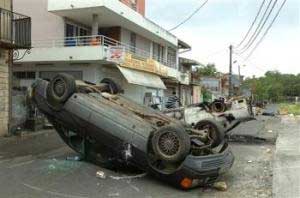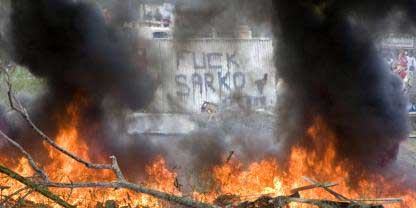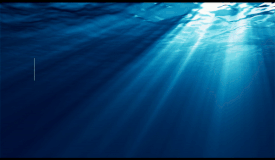 POINTE-A-PITRE, Guadeloupe (AFP) - A union activist was killed overnight in Guadeloupe as the month-long strike on the French Caribbean island escalated into riots and shootings, local authorities said on Wednesday.
POINTE-A-PITRE, Guadeloupe (AFP) - A union activist was killed overnight in Guadeloupe as the month-long strike on the French Caribbean island escalated into riots and shootings, local authorities said on Wednesday.
Jacques Bino, aged in his 50s, was shot dead while driving his car near a roadblock manned by armed youths who opened fire at police with buckshot in Pointe-a-Pitre, the island's main city, officials said.
It was not immediately clear who shot him, but he was the first victim of the escalating violence on the island crippled since January 20 by a general strike over the high cost of living.
"There were no police nearby," said local prosecutor Jean-Michel Pretre.
Bino's car was hit three times by 12-gauge Brenneke-style shotgun slugs. Two rounds hit the rear of the vehicle and the third was fired through the front passenger window and fatally wounded Bino in the chest.
"These were not stray rounds," Pretre said, adding that he was investigating the possibility that, given their age, Bino and his passenger had been mistaken for plain-clothes police officers by the youths.
He said, however, he had not ruled out other possibilities. "Here, everyone is armed," he explained, adding that Guadeloupe has four times the murder rate of any mainland French region with a similar population size.
Prime Minister Francois Fillon condemned the "extremely serious violence" in a statement and the interior minister called a crisis meeting to address the deteriorating security.
Six members of the security forces were slightly injured during clashes with armed youths, police said.
Bino, a tax official, was returning from a labour meeting, said Elie Domota, leader of the Collective Against Exploitation (LKP), the coalition of unions and leftist groups that launched the strike.
Gangs of youth's looted shops smashed storefront windows and threw up burning roadblocks overnight along the main streets of Pointe-a-Pitre and in at least two other towns. At least 13 people were detained.
"The government's message is first of all to appeal for calm, that is the most important thing," said spokesman Luc Chatel in Paris.
"Everyone is better off finding a place at the negotiating table than on the barricades," he told Europe 1 radio.
Ary Chalus, mayor of the town of Baie-Mahault where three police were hurt, described the scene as "chaos."
"We have 15-year-old children who are clashing with police. We may well have families in mourning," he warned.
 The LKP has said it plans to step up protests this week after the government refused to bow to demands for a monthly 200-euro (260-dollar) pay increase for low-wage earners.
The LKP has said it plans to step up protests this week after the government refused to bow to demands for a monthly 200-euro (260-dollar) pay increase for low-wage earners.
Domota appealed for calm but also accused French authorities of treating the island, one of its four overseas department, like a "colony."
"Guadeloupe is a colony because they would never have allowed the situation to fester for so long in a French department before taking action," Domota said on RTL radio.
The conflict has exposed race and class divisions on the island, where the local white elite wields power over the black majority.
The economy is largely in the hands of the "Bekes," the local name for whites who are mostly descendants of colonial landlords and sugar plantation slave owners of the 17th and 18th centuries.
A Socialist opposition leader, Malikh Boutih, said it was "shocking" to watch a police force "almost 100 percent white, confront a black population" and drew a parallel with the 2005 suburban riots in France.
"There are no concrete buildings, there are palm trees, but it's the same dead-end, the same 'no future' for young people, with joblessness and a feeling of isolation," Boutih said.
President Nicolas Sarkozy plans to meet elected officials from Guadeloupe and other overseas departments in Paris on Thursday to take stock.
As Guadeloupe's general strike against rising prices spreads across the Caribbean police clamp down and shoot a demonstrator.
Workers in Guadeloupe launched a general strike on 20 January in protest at the rising cost of living.
Most businesses, services and government departments across the island have been totally shut down since the strike began, and over a quarter of the population has taking to the streets.
Earlier this month workers in neighbouring Martinique joined the strike, and last night saw heavy rioting as impoverished residents escalated their struggle. Protesters burned shops and businesses and erected roadblocks with overturned cars and chopped down coconut trees.
Strikers warned that the government was preparing to murder demonstrators in order to quell the rebellion, after heavily armed French gendarmes were sent to the region.
Despite emissaries sent from Paris, and the dispute being isolated by French unions the strike has continued with shops out of stocks and petrol pumps running dry. At the height of the tourist season, two thirds of the 15,000 hotel beds in Guadeloupe are empty.
The Hindu reported that the strike is also being played out in the backdrop of tensions between the original inhabitants of the islands and the "Bekes", white colonisers who used slave labour to cultivate huge plantations until slavery was abolished in 1848. Former slave owners and a small white minority have kept a tight grip on the islands' economy ever since. "The situation in Guadeloupe is not far from social apartheid," warned Christiane Taubura, an MP from French Guyana. "The leaders of the strikers are not anti-white racists. They are exposing a reality...a caste holds economic power and abuses it," she told Le Journal du Dimanche.
The islands rely almost exclusively on imports sold in French-owned supermarkets at significantly higher prices than in France. A packet of rice or pasta, for instance, costs 90 per cent higher than in the "metropole". Petrol too is far more expensive.
The union delegate for Unsa police has said that the police are overwhelmed and facing 'guerilla tactics' and has warned people to stay in their homes.
400 gendarme's mobiles have already arrived and more are on the way.
The dead man is called Jacques Bino, and he was shot dead by a barricade, it's unclear who by at the moment.
The authorities are claiming that after the 'first' gunshot was heard police came under attack and three were injured and that they were driven back by gunshots, probably from a shotgun.
Police have reported three injuries from shotgun wounds in the capital as well.













